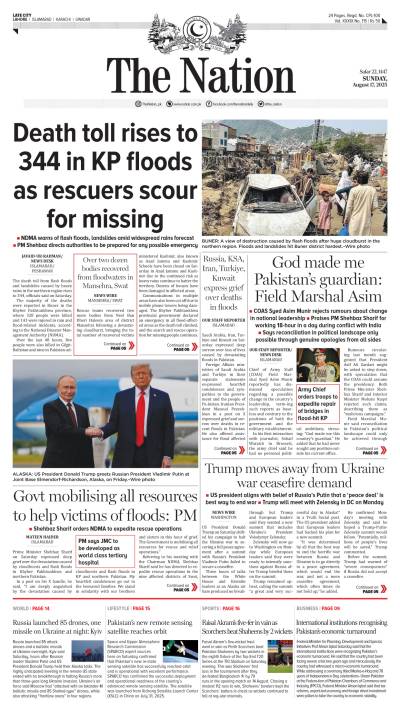The Accountability Court on Friday announced 10 years imprisonment to Nawaz Sharif and fined him eight million pounds in the Avenfield reference case.
The judge Muhammad Bashir announced sentence of seven years imprisonment to Maryam Nawaz beside one year imprisonment for forging documents. Maryam was also fined 2 million pounds. The court ordered Capt (R) Safdar to one year imprisonment. Maryam and Safdar have also been disqualified from contesting election for 10 years.
Prior to that, the Accountability Court "discussed the verdict with lawyers" as the nation awaited the cliffhanger verdict in the Avenfield reference case.
Earlier, the Accountability Court delayed the verdict for five times at 11:00 am, 12:30 pm, 2:30 pm, 3:30 pm and then at 4:30 pm on Friday.
According to media reports the verdict comprised of almost 100 pages.
The Accountability Court announced its verdict in the Avenfield corruption reference filed by NAB against disqualified premier Nawaz Sharif , Maryam Nawaz, Hussain Nawaz, Hassan Nawaz and Capt (retired) Safdar today on July 6.
Strict security arrangements, including paramilitary personnel, were in place at the Federal Judicial Complex, where the court is located. The roads leading to the complex have also been closed to traffic.
Moreover, the district administration has imposed Section 144 in the capital and in cities of Lahore and Rawalpindi to discourage protests.
After submitting Begum Kulsoom Nawaz's medical report, Maryam's counsel Amjad Pervez argued that the law stipulates the presence of the accused when the verdict is read out. After the prosecution opposed any delay at such a late stage of the trial, the judge reserved his verdict and adjourned the hearing for an hour.
The court reserved the judgment after the defence counsel concluded his arguments in the case on Tuesday (July 3). The court directed all the accused in the Avenfield corruption reference to ensure their presence before it on Friday.
The accountability court reserved the judgment in the Avenfield case after 117 hearings in which Sharif appeared for 78 times, Maryam Nawaz 80 times and Capt (retired) Safdar for 92 times. The hearing was completed in nine months and 20 days.
The NAB filed the Avenfield corruption reference against the Sharif family on September 8, 2017. Later, it also filed a supplementary reference in the same case on the basis of new evidence on January 22, 2018. The prosecution produced a total of 19 witnesses before the court in the Avenfield case.
The accountability court indicted Nawaz Sharif on September 26, 2017, and Maryam Nawaz and Capt (retired) Safdar on October 19, 2017.
The former premier appeared before the court for the first time on September 26, 2017, and Maryam Nawaz on October 9 in the case. On October 26, the accountability court issued bailable arrest warrants for Nawaz Sharif over his frequent absence from the court.
On June 11, defence counsel Khawaja Harris along with his team recused himself from all the corruption cases against the Sharif and withdrew his power of attorney, stating he could not work under pressure.
He, however, again appeared before the court on June 19 and filed a new petition for withdrawal of his earlier application through which he had recused himself from the corruption references against Sharif.
The court had also declared Hussain Nawaz and Hassan absconders after their failure to show up in the court in the Avenfield case.
Earlier, Amjad Pervez, defence counsel for Maryam Nawaz, while giving final arguments in the Avenfield reference, stated the joint investigation team (JIT) that probed the Panama Papers from the very beginning had made up its mind to tighten the rope against the Sharif family. He said an investigation based on honesty could only fulfill all requirements of a fair and transparent trial.
He pointed out the JIT did not take on board Lawrence Redley and Arena for investigation, which put a question mark on the status of the investigation and made it partial and biased. He said all the documents which went in favour of the Sharif family were not made part of the JIT report. He argued the JIT also did not furnish any reason for not making these documents part of the report.
“The Panama JIT team did not make any effort to dig out known sources of income of the Sharif family,” said Pervez. He said the JIT did not reveal information about mutual legal assistance (MLA) correspondence. “It could be mysterious why the JIT did not disclose the information about those MLAs that was furnished by the authorities concerned,” he questioned. He said the JIT demonstrated its biased conduct by hiding the information received in the response of the dispatched MLAs.
The defence counsel alleged, without receiving any response and reply about the real owners, it was contended in the court by the prosecution that Maryam Nawaz was a beneficial owner of Avenfield properties. He said the JIT did not receive any reply regarding the MLA of May 31, 2017. The JIT had a register to maintain a record of letters, Pervez said, adding there was no record available about the documents attached with the JIT report.
He said on the basis of British Virgin Islands (BVI) letters, a case was framed against Maryam Nawaz and the prosecution failed to prove the stance. Section G-21 was not implemented in this particular case, Pervez said, adding Maryam Nawaz had refuted the BVI letters. He also added the law considered second-hand evidence and testimonials as weak testimonies. “These are third-hand pieces of evidence and the law doesn’t give any importance to such meager evidence,” he argued.
The defence counsel also stated the FIA and the BVI never stated that Maryam Nawaz was the beneficial owner of Avenfield properties. He contended any paper evidence coming from outside the country could not be solely relied upon. It had to be identified and judged in accordance with the law of the land.
He said the evidence provided by JIT head Wajid Zia was based on hearsay and the documents presented by him were baseless and grounded on hearsay.
Meanwhile, hearing in the Al-Azizia corruption reference was held in the accountability court and Wajid Zia was cross-questioned by Sharif’s counsel. Zia informed the court that as per professional licence of Ahle Steel Company, Abdur Rasheed Ahle and Tariq Shafi were partners. He also told the court that a copy of this licence in Arabic manuscript was also available on page 70 of Volume-111 of the JIT report. He also said a translated copy of this licence was available on pages 87 and 88 of the JIT report. He contended the address of the working place was also mentioned on the licence.








